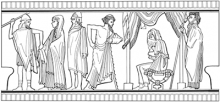
You are here
Episode 6: Greek on Greek - Wounded Pride
Story summary
Chapters
Teaching activities
- Starting points
- Follow-up
- Further activities
- Ask learners to describe the Greek camp in detail, perhaps reading a section of the transcript to get them started.
- Discuss the relationship between Paris and his brother Hector. Do these two seem to like each other? How are they similar or different?
- Read out the closing paragraph of Episode 5. Ask what it suggests Episode 6 may be about. (Hector is hoping that the Greeks will grow weary waiting outside the walls of Troy with no one to fight. Episode 6 shows what happens when armies get bored — they start arguing among themselves.)
- Explain that, after hearing this episode, you will ask them to give you evidence of how Achilles’ behaviour is affecting the Greek camp. (Achilles is restless; an unsettling influence.)
- What do they think the title means? (It refers to the growing animosity between the Greeks. The wounded pride is both Agamemnon’s, for having to give up a slave-girl; and Achilles’, for having Briseis taken from him by Agamemnon.)
- Discuss the answers to the previous two questions (see above).
- What do learners think of Achilles? Do they like him? Has their opinion changed? Is this how ancient Greek heroes — or any heroes — usually behave?
- Which verb showed how Achilles moved through the camp? The same verb is applied to something else in the story. What? (“Prowled”, also applied to the mice.) How does this word link these two different things? (Both Achilles and the plague of mice are hostile to the well-being of the camp.)
- Agamemnon sends two servants to collect Achilles’ slave-girl, Briseis. They had orders from their king, so why were they afraid? (They think Achilles may kill them in his anger.) Ask the class to imagine the servants discussing their orders. Begin with improvisation and later ask them to write this as a play, adding details of the setting and stage directions.
- The prophet, Calchas, is worried that what he has to tell Agamemnon will anger him, so he asks Achilles for protection. Discuss Calchas’ trust in Achilles. How does Agamemnon show his contempt for this news? (“Old man, would good news burn your tongue?”) What does this mean?
- Who restrained Achilles when he was angry with his king? (Patroclus.) He intervened in two ways, without speaking. What did he do? (He put a hand on Achilles’ shoulder; he shook his head.)
- Why does Achilles feel he can refuse to fight? (He never swore an oath to protect Helen.) Does he have a point about the way he has been treated? Is there any evidence? (Achilles reminds Agamemnon he has had his slave-girl taken away.)
- Give the class the extract from the
![[pdf] [pdf]](/sites/default/files/pdf_icon.png) transcript that begins “That night, when the sky was bright with stars” and ends with “Down that path walked Thetis.” Ask them to imagine the tranquility, the beauty of the scene. Contrast this with the anger and turmoil felt by Achilles. Why does the storyteller say the last line much more slowly? (The pace at which Thetis walks is in contrast to the quick anger of Achilles. We have the feeling that Thetis knows her son well and has done this kind of thing before! The pace and the economy of the language show the strength of this mother-son relationship.)
transcript that begins “That night, when the sky was bright with stars” and ends with “Down that path walked Thetis.” Ask them to imagine the tranquility, the beauty of the scene. Contrast this with the anger and turmoil felt by Achilles. Why does the storyteller say the last line much more slowly? (The pace at which Thetis walks is in contrast to the quick anger of Achilles. We have the feeling that Thetis knows her son well and has done this kind of thing before! The pace and the economy of the language show the strength of this mother-son relationship.) - Thetis asks Zeus to help Achilles. At the beginning of the story, Zeus was the first to see Thetis. What was she doing? (She was riding on a dolphin’s back.) Should Thetis have asked this favour? Could she have known Zeus would make it all end in such a tragic way?
Discuss the qualities one needed to be regarded as a good Greek citizen. Would Achilles qualify?
Was Patroclus a good friend? If so, how did he demonstrate this?
Visual aids
Briseis taken from Achilles
Based on a cup by the Briseis Painter, c. 480 BC. British Museum, London.
After his very public argument with Achilles, Agamemnon insisted on taking away Achilles’ favourite slave, Briseis, as a way of asserting his authority as commander of the Greek armies. In this picture Briseis (second from the left) is being led away from Achilles’ tent by two attendants, while Achilles (second from right) stays sitting on a stool, his face covered (perhaps to conceal his distress?).
